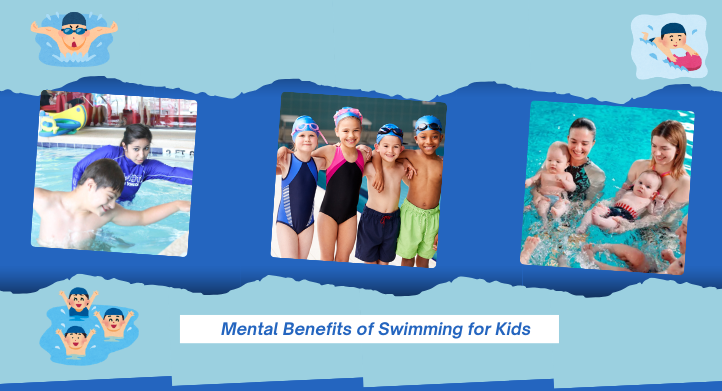What Are the Mental Benefits of Swimming for Kids?
mental benefits of swimming for kids are below:
- Preventing children from drowning which is an important life skill
- Becoming confident
- Improving balance, strength, and flexibility
- Developing kids' motor skills
- Promoting deeper sleep
- Helping to be calm and reducing stress levels
- Building independence
- Improving teamwork and having discipline
- Strengthens relationships between child and parent
- Preventing children from becoming overweight
- Improving concentration for a kid with ADHD
- Feeling calm for a kid with Autism
First you should know that there are lots of benefits of swimming, but for now let’s go through each one of these benefits:
Drowning Prevention
According to the NDPA website, statistics show that there is an average of 4012 drowning deaths per year, and children aged one to four and up to 14 will face it more.
One of the benefits of swim lessons for kids is that Learning it will reduce the risk of drowning, which is an accidental death in children.
Water Confidence
When children learn how to swim, it makes them feel better about themselves because, inside, they feel brave.
Motor Skills and Coordination
Swimming is a powerful activity that improves the kids’ movement. Kids have to kick and float in water, which requires good movement of arms, legs, and core. These motor skills will improve in children, especially at the age of 3 to 11. This skill helps children in their daily activities.
Better Sleep
After swimming, children are ready for bed much earlier and tend to sleep peacefully.
Stress Relief and Mood Boosting
movements and breathing ,which can help them to become distracted from all the stressful thoughts.
Independence
There are so many challenges in swimming that can build independence in children:
- Kids have to wear a swimsuit before swimming
- Kids have to take a lesson and do it in water on their own, and they have to lean on themselves
- After swimming, kids have to take a shower, dry themselves, and put on clothes
Social Skills
In swimming, warming up to group lessons, learning to follow directions, share equipment, and participate in group activities can help children develop teamwork.
Parent-Child Bonding
When you take your kid to swim classes and then pick them up, you will build a great relationship between you and your child. Because on the way back home, the kid will talk to the parent about the swimming lessons, the friendship he made in swim class, and all the teamwork, when you listen, the kid feels closer to you.
Prevent becoming overweight
According to the National Institutes of Health website, about 1 in 6 children are overweight, and 1 in 5 children have obesity. Mental benefits of swimming for kids is to help them not become overweight or obese. With swimming, kids’ metabolism will boost and their muscle mass will increase, and finally, their body fat will decrease.
ADHD Support
Swimming is an excellent way for children with ADHD to manage their hyperactivity and improve focus. The repetitive motion of swimming helps release excess energy. After 12 weeks of swimming, children with ADHD can get high scores in some school lessons that require concentration, like math.
Autism Support
Swimming helps children with Autism Spectrum Disorder (ASD) to communicate more clearly, and feel more at ease around other children after each class.
FAQ's about mental benefits of swimming for kids
Why is swimming good for kids with ADHD?
Swimming helps to release excess energy and promotes calmness, which is beneficial for children with ADHD. It helps them focus better in school, reduces impulsivity, and supports behavioral control.
Why do autistic kids love swimming?
Swimming provides a friendly environment, helping children with autism to engage in repetitive, rhythmic movements which makes them feel more at ease.
Why do kids cry during swim lessons?
Kids have a fear of water because being in water and swimming is something that they are not familiar with, this will lead them to cry during swim lesson. With support and patience this will be solved.
What is the best age to teach a child to swim?
The ideal age to start swim lessons is around 3 to 4 years old, but some swim coaches believe that children should start learning to swim at the age of 6.
At what age can most kids swim independently?
Most kids are able to swim independently by age 5 or 6, though this can vary based on the child’s physical development, comfort level with water, and the frequency of lessons.
What is the peak age for swimming?
For a swimmer to become elite requires 8 years of training and women tend to peak earlier than men in swimming:
- Elite female swimmers tend to reach their fastest performances in the 50-100 meter swimming event at the age of 19-20, while elite male swimmers typically achieve their peak performance in this event at the age of 22-23.
- Elite female swimmers tend to reach their fastest performances in the 200-800 meter swimming event at the age of 18-20, while elite male swimmers typically achieve their peak performance in this event at the age of 20-22.
- Elite female swimmers tend to reach their fastest performances in the 1500 meter swimming event at the age of 18, while elite male swimmers typically achieve their peak performance in this event at the age of 20.
- Elite female swimmers tend to reach their fastest performances in the open water swimming event at the age of 27-29, while elite male swimmers typically achieve their peak performance in this event at the age of 28-29.
Does swimming help kids with speech development?
Breath control and rhythmic breathing in swimming can help speech fluency.
Is swimming effective for kids with sensory processing issues?
Yes, swimming can help children with sensory processing issues by providing a calm, controlled environment. The sensory experience of being in water can soothe overstimulated children and help them process sensory information more effectively.
How does swimming help kids with mental health issues like depression?
With swimming, endorphins will be released, which decreases the feeling of depression in kids.
How does swimming help kids with mental health issues like depression?
With swimming, endorphins will be released, which decreases the feeling of depression in kids.
How often should my child swim to see mental health benefits?
it’s ideal for children to swim at least 2-3 times a week to help them release stress and promote overall well-being.
Can swimming be helpful for shy children?
swimming helps shy children to build confidence, exercise in teams, and experience the calming benefits of water.



Leave A Comment